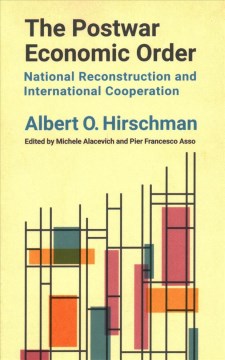
The Postwar Economic Order
Publisher,Columbia Univ Pr
Publication Date,
Format, Paperback
Weight, 408.23 g
No. of Pages, 342
Between 1946 and 1952, Albert O. Hirschman, a German-born economist and wartime refugee, worked as an economic analyst in the Research Division of the Federal Reserve Board of the United States. He was first in charge of the Western European desk; laterhe was the Fed's representative to the Economic Cooperation Administration, the organization responsible for the Marshall Plan. In that capacity, Hirschman wrote a number of internal reports about early reconstruction policies in Europe, the first efforts at intra-European cooperation, and the uncertainties that surrounded the shaping of a new international economic order with the United States at its core. Europe, the Marshall Plan, and the Post-War International Order is a collection of these interrelated pieces compiled into book form. In aggregate they provide the reader with a behind the scenes view of the American rationale for an economically rebuilt and integrated Europe, written by someone who would go on to become one the the twentieth century's most significant economic thinkers. This collection offers a first-hand analysis of crucial developments in post-war European history and US-European relations. The essays featured here offer a nuanced and sophisticated analysis of major post-war problems such as the global dollar shortage." Hirschman's skill and style are brought to the uncertainties of economic policymaking in the post-war years in a compelling manner, highlighting the often counterintuitive and paradoxical sequences of specific economic and political processes. Further, Hirschman's writings provide an advanced view of what would become signature concepts in his later work, including "inverted sequences," inducement mechanisms," and "staged sequences of policymaking." Europe, the Marshall Plan, and the Post-War International Order is a valuable addition to our understanding of the post-war international economic order and to Hirschman's critical thinking on processes of economic development, policymaking, and reform"--

